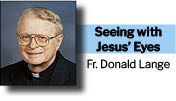
My computer seems to have a sense of humor. As I worked on an article on resentment, it asked, “Do you wish to delete resentment?”
I laughed. Deleting resentment is not that easy! It takes time, patience, forgiveness, love, and the Holy Spirit. I know!
We are created in God’s image. Since God is love, we image God best when we love, but our ability to love has been wounded by original sin. Therefore, we need to forgive and be forgiven to free us to be loving persons as God intended!
Hurting our ability to love
In 1 Corinthians 13:5, it tells us that brooding over injuries can hurt our ability to love!
It often begins when someone hurts us by a slanderous remark, a friendship betrayed, being bullied, or other sins. Our instinct is to retaliate in thoughts or deeds.
Reverend Dr. Martin Luther King, Jr., said that resentment multiplies hate. When we recall the hurt, it may rise up, enslave us, magnify the original hurt, and make it difficult to forgive!
A bumper sticker reads, “I don’t get mad. I get even!’’
Holding onto hurts can make us bitter and resentful, physically sick, and keep us from being merciful.
In the Bible, Cain resents Abel. Joseph is resented by his brothers, and Saul resents David. The Pharisees, Scribes, and Sadducees resented Christ.
In Ephesians 4:31-32 it says, “Get rid of all bitterness, passion, anger, harsh words, slander, and malice of every kind. Instead, be kind, compassionate, and mutually forgiving, just as God has forgiven you in Christ.”
On January 24, 2014, Pope Francis said, “It’s important after a stormy argument to build dialogue quickly. Time allows walls of resentment to grow taller and reconciliation becomes very difficult!”
Peter Marshall said, “If you hug to yourself any resentment against anyone, you destroy the bridge by which God would come to you.”
If resentment imprisons us, Christ will help us build a bridge of reconciliation to free us if we let him. Building such a bridge takes grace, hard work, humility, patience, and much longer than a day, but it’s worth it.
Some naturalists say that a cornered rattlesnake may become so angry that it sometimes bites itself. Harboring hate and resentment against others is like biting oneself with poisonous fangs. Resentment’s venom penetrates deeply into our entire being. There, resentments tend to recycle themselves, mutate, and become stronger.
Love your enemies
Jesus said, “Love your enemies and pray for those who persecute you!” William Barclay, the Protestant Bible scholar wrote, “No one can pray for another and still hate that person!”
Christ showed us how to love, redeemed us from sin which hurts our ability to love.
Fr. Eugene Hemrick wrote that resentment is one of priesthood’s greatest enemies. It can kill kindness, the virtue that parishioners most desire of their priests. He added that in his opinion, resentment is perhaps the major psychological addiction of all time and has hurt the Church.
In Colossians 3:13, it says, “Forgive whatever grievances you have against another. Forgive as Jesus has forgiven you.”
Close friends can often hurt us. A woman got in a big argument with her brother over something trivial that escalated into an uncivilized civil war. For years she and her brother resented each other and were unable to forgive each other. Their dying mother begged them to forgive each other and be reconciled. When they did, they were inseparable. Her brother died in her arms. She gratefully said that these were the best years of her life. Forgiveness destroyed the resentment that kept them apart and brought them together again.
Dealing with injuries
As a youth, I had the bad habit of brooding over injuries and have partially but not completely overcome it. I learned a few ways to deal with resentment.
First, we can face it and try to discover its cause. This helps us to limit and control it.
Second, we need to forgive ourself. A true friend, spiritual director, or counselor can help us face resentment. There is an old saying that when we share with a compassionate friend, joys are doubled and sorrows are cut in half.
Third, we have to realize that resentment often hurts us more than the other person. Coping with resentment helps us come closer to God on the deepest level of love and forgive those who have betrayed us or been unjust towards us.
Corrie Ten Boom survived a Nazi concentration camp. After World War II, she lectured on forgiveness and reconciliation. One night a man thanked her for her talk. It was one of the hated prison guards. When he reached out to shake her hand, Corrie froze. She prayed, “Lord, I cannot forgive this man. Please help me.” God empowered her to forgive him.
Let’s ask God to help us do what we cannot do ourselves, namely to forgive someone who hurt us so that we are free to love others, especially those who feel lonely, rejected and feel like the least of God’s people.
Fr. Donald Lange is a pastor emeritus in the Diocese of Madison.

